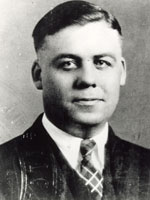 FBI Inspector, Samuel Cowley (courtesy - FBI)For many today….both inside and outside the FBI… the name Inspector Sam Cowley usually reflects a recollection of maybe some limited role he played in the 1930s “War On Crime.” Eclipsed in the media over the decades by Purvis, most only recall Cowley being sent to Chicago to oversee Purvis and being killed at the Barrington, Il shootout months later.
FBI Inspector, Samuel Cowley (courtesy - FBI)For many today….both inside and outside the FBI… the name Inspector Sam Cowley usually reflects a recollection of maybe some limited role he played in the 1930s “War On Crime.” Eclipsed in the media over the decades by Purvis, most only recall Cowley being sent to Chicago to oversee Purvis and being killed at the Barrington, Il shootout months later.
However, appreciation of Cowley’s place in Bureau history can’t be done without examining the files. Cowley’s role at HQ during those early 30s was a total emersion into the headline cases of the period, supervising multiple simultaneous major cases from his FBIHQ position and having a unique ability to handle “nine irons in the fire.” He was clearly Hoover's “point man” in the high-profile gangster-related crimes and kidnapping arena which was eating up the manpower and the budget. His administrative qualities are very admirable as evidenced by an exam of his reporting to Hoover and others as to what was going on in the field in a variety of areas. He was in contact with Purvis and issuing instructions to Chicago long before he even arrived there. And the Dillinger case was just one instance of the many major cases being worked; every major case had sometimes up to ten or twenty accomplices and co-conspirators.
Bureau files reveal that Cowley arrived in Chicago at Hoover's insistence sometime during the June 1934 period, working side by side with Purvis. By then, Purvis was probably over his head, perhaps through no fault of his own, and the administration of many cases at hand was suffering. As far as Hoover was concerned, investigative progress was waning in far too many instances.
Cowley stayed in Chicago and those who served in the Bureau would appreciate it more, but the responsibilities that Hoover laid on Cowley in the fall of '34 are unimaginable. And with no cell phones, no computers, no analysts and no "Emergency Response Teams" for evidence collection, etc.
The ink on that letter to Cowley would hardly be dry when he and SA Herman Hollis were killed by Nelson/Chase about a month and a half later.
I had the honor to speak to Cowley’s surviving son some years back. He had only wished his father had received the credit due for his role during those violent years. His son had mentioned that Cowley was not publicity prone and really shunned the media during those years. He left no photos, diaries or papers behind of his FBI career. We talked about Cowley's devotion to the Mormon religion. That's when his son chuckled and said, “yes....but he was one hell of a poker player too!”
Readers can view Hoover's instructions to Cowley in September, 1934 at this link.
